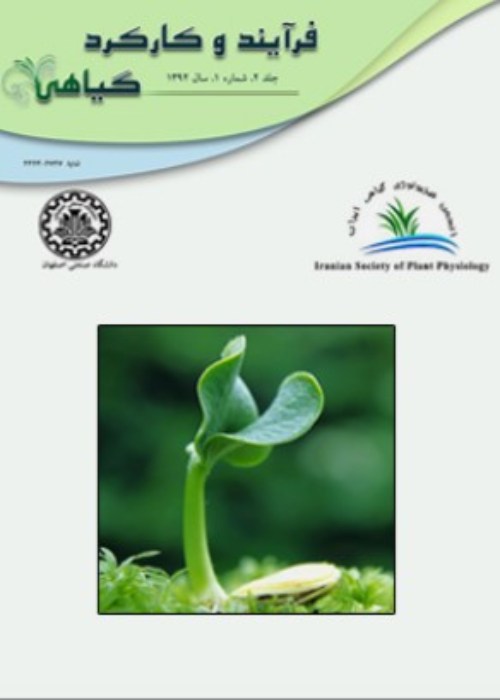Ameliorating effect of proline, chitosan and its derivatives on photosynthetic pigments, chlorophyll fluorescence indices, qualitative characteristics and yield of greenhouse tomato (Lycopersicon esculentum Mill.) under deficit irrigation conditions
Nowadays, to ameliorate the effects of environmental stress on agricultural products, the use of biological compounds has drawn much attention. In order to investigate the ameliorating effect of some biological compounds on fluorescence indices, photosynthetic pigments and yield of greenhouse tomatoes under deficit irrigation conditions, a split plot experiment was conducted as a randomized complete block design in the research greenhouse of University of Hormozgan. The experimental factors included three irrigation levels (full irrigation as control, moderate and severe deficit irrigation) as the main factor and foliar application of different biological compounds (control, proline, chitosan and N-Succinyl (NSC) and N, O dicarboxymethylate chitosan (NOC)) as a sub-factor. When biological compounds were applied, the amount of chlorophyll a, chlorophyll a/b, and carotenoids content were increased at each irrigation level as compared to the control, so that the highest increases in these traits were observed with NSC. In most cases, under severe deficit irrigation, the use of biological compounds increased the leaf proline content and the highest increase was observed with the foliar application of proline. Under moderate and severe deficit irrigation conditions the highest values of Fv/Fm were obtained with chitosan and NSC, respectively so that these two compounds caused 22.4 and 21.8% increase in Fv/Fm as compared to the control. The highest taste index (1.06) was observed with the use of chitosan in severe deficit irrigation condition due to increasing in fruit TSS and TA contents. Among the biological compounds, NSC and chitosan had the greatest improving effect on the tomato fruit yield. Thus, NSC foliar application increased fruit yield in control, moderate and severe deficit irrigation by 32.5, 91.17 and 24.33%, respectively. Therefore, according to these results, under deficit irrigation conditions, chitosan and its derivatives can reduce the effects of drought stress on tomatoes more efficiently than proline.
- حق عضویت دریافتی صرف حمایت از نشریات عضو و نگهداری، تکمیل و توسعه مگیران میشود.
- پرداخت حق اشتراک و دانلود مقالات اجازه بازنشر آن در سایر رسانههای چاپی و دیجیتال را به کاربر نمیدهد.




